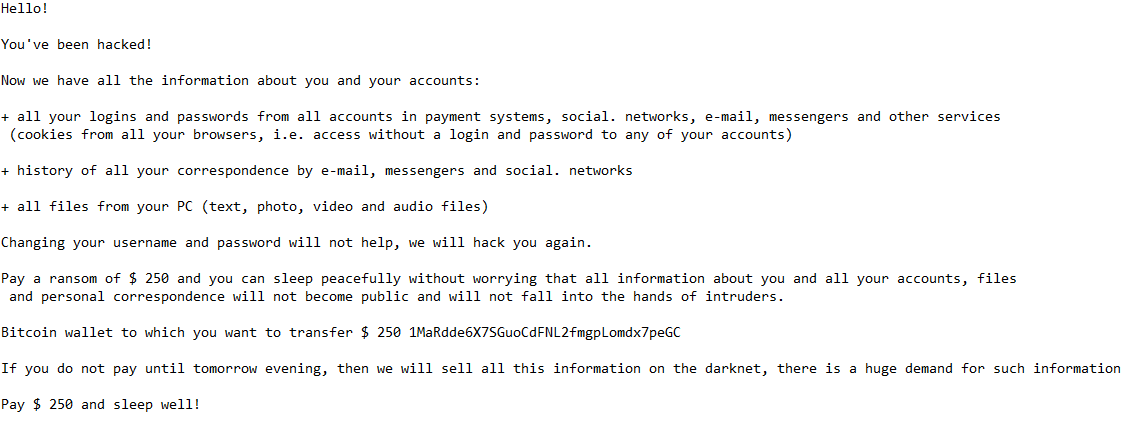“You’ve Been Hacked!” email is a scam email that claims the recipient’s information has been stolen and will be sold on a hacker forum unless $250 in Bitcoin is paid. The contents of the email are completely false. If you receive this email, your computer has not been hacked, and you can ignore the email.
“You’ve Been Hacked!” email is a generic scam email, part of a campaign that tries to trick users into paying hundreds of dollars to not get their personal information sold on hacker forums.
The email has an eye-catching subject line “You’ve been hacked!”. While this email will likely end up in the spam folder, if users check the folder, the subject line will certainly make some users open the email. The sender claims that the recipient’s computer has been hacked and all information stolen. Supposedly, that includes login credentials for social media, email, messaging services, etc., history of correspondence, and all files on the computer.
The sender threatens to sell the information on the darknet if the recipient does not pay $250 in Bitcoin to the provided wallet address. Because the contents of this email are false, users can just ignore it.
Hello!
You’ve been hacked!
Now we have all the information about you and your accounts:
+ all your logins and passwords from all accounts in payment systems, social. networks, e-mail, messengers and other services (cookies from all your browsers, i.e. access without a login and password to any of your accounts)
+ history of all your correspondence by e-mail, messengers and social. networks
+ all files from your PC (text, photo, video and audio files)
Changing your username and password will not help, we will hack you again.
Pay a ransom of $ 250 and you can sleep peacefully without worrying that all information about you and all your accounts, files and personal correspondence will not become public and will not fall into the hands of intruders.
Bitcoin wallet to which you want to transfer $ 250 1MaRdde6X7SGuoCdFNL2fmgpLomdx7peGC
If you do not pay until tomorrow evening, then we will sell all this information on the darknet, there is a huge demand for such information
Pay $ 250 and sleep well!
These emails come in all forms. A common similar email is a sextortion scam email that threatens to reveal users’ explicit videos if they do not agree to pay at least several thousand dollars. These emails use various tactics to put pressure on users, including causing serious anxiety and fear. In the case of sextortion emails, the threat of explicit videos associated with them being sent to contacts often pressures users into paying.
This “You’ve Been Hacked!” email scam uses the same tactics. Scammers specifically mention all the platforms that have a lot of highly personal information and threaten to sell all of it. However, no matter how realistic these emails may seem, they are fake. Paying would be a complete waste of money as there is no malware on the computer, nor has information been stolen.
Why did you receive this email?
These malicious email scams are operated by several different scam groups. But they are all more or less identical to one another. Unfortunately, if you’ve received one email, you will receive more of them in the future because your email address is being sold on hacker forums. Users’ email addresses are frequently leaked by services with poor security. Because of this, it’s not a good idea to sign up for questionable services like mobile apps and random websites using your primary email account, especially if you use it for important logins. If an email address gets leaked, it will start appearing in various data dumps that can be found on hacker forums. You can check whether your email address has been leaked on haveibeenpwned. There’s nothing you can do even if it has but you can at least be careful and be on the lookout for more scams.
One important thing to mention about these kinds of scams is that they also occasionally reveal users’ actual passwords. Password reveal is a very effective tactic because it convinces people that malware is present on their computer and gives the email credibility. In users’ minds, there is no other way the sender would know their password if not because they hacked their computers. But in reality, the same hacker forums that sell email addresses also sell leaked passwords. Many platforms and services have very poor security and do not properly secure passwords. If passwords are kept in plain text, they can be stolen during a cyber attack. The stolen information is subsequently sold to other malicious actors on hacker forums.
If you get a threatening email that reveals your password, you need to change the password right away. Passwords need to be difficult to guess and complex, and ideally made up of random combinations of capital and lowercase letters, numbers, and symbols. Passwords also have to be unique for each account. Password managers are an option for users who struggle with creating and remembering passwords.
Site Disclaimer
2-remove-virus.com is not sponsored, owned, affiliated, or linked to malware developers or distributors that are referenced in this article. The article does not promote or endorse any type of malware. We aim at providing useful information that will help computer users to detect and eliminate the unwanted malicious programs from their computers. This can be done manually by following the instructions presented in the article or automatically by implementing the suggested anti-malware tools.
The article is only meant to be used for educational purposes. If you follow the instructions given in the article, you agree to be contracted by the disclaimer. We do not guarantee that the artcile will present you with a solution that removes the malign threats completely. Malware changes constantly, which is why, in some cases, it may be difficult to clean the computer fully by using only the manual removal instructions.
